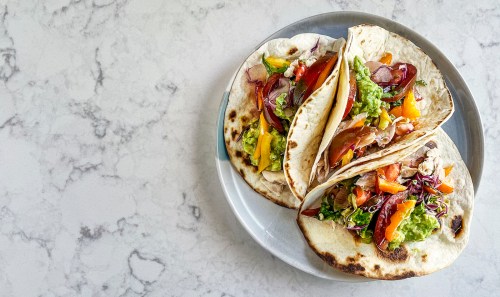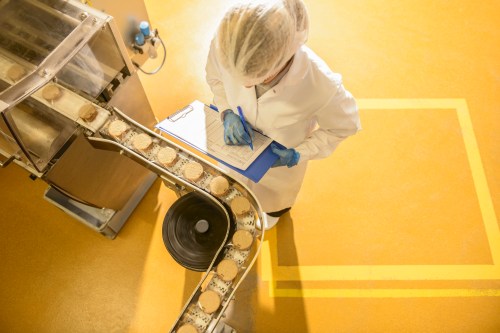As a registered dietitian of over 22 years, understanding why bone health is important is nothing new. Yet, as important as bone health is, other health-related focuses always seemed to take priority when I was younger. Perhaps bone health isn’t as “sexy” or top-of-mind as heart health or general wellness support. Or maybe I was too young to realize and accept that the hormonal shift that will happen once I enter the menopausal transition can negatively impact my bone health—and what that could mean for my quality of life. But honestly, how many 20-year-olds think about their bones and menopause?
As I’ve gotten older, the concept of caring for my bones before menopause has clicked. Almost every female in my family had developed osteoporosis, a condition in which there is a decrease in the thickness of bone tissue, once she reached her menopausal years. These ladies were not sedentary or weak when they got their diagnoses—they were active ladies who ate relatively well. I saw how easily their bones broke, how difficult it was to heal them, and what a toll these effects could have on their day-to-day.
Needless to say, once I celebrated my 40th birthday and realized that menopause was right around the corner, I was sold on the notion of eating to help keep my bones healthy and strong for as long as possible. While family history isn’t the only risk factor for developing osteoporosis, it does increase one’s chances. As such, maintaining bone health before menopause may be one important step in living a fracture-free life well into my golden years.
How I support my bone health in my 40s
The first thing I did was start prioritizing exercises that involve impact on my bones, like brisk walking, exercises that involve jumping, and tennis, instead of only sticking to low-impact choices like swimming. The mechanical stress applied to the bones during impact exercise stimulates the production of new bone.
Beyond exercise, I began making some slight changes to my dietary habits. I habitually took certain nutritional supplements to help bridge gaps in my diet. Life Extension Low Dose Vitamin K2 is one of my must-haves, because I can confidently say I don’t eat enough sources of this nutrient regularly. Vitamin K2 is a form of vitamin K that plays a role in bone health. Some data suggests1 that supplementation may have a significant effect on reducing bone loss.
Regarding dietary choices, I always ate a diet rich in fruits, veggies, and other nutrient-dense goodies, but even with eating a balanced and nutritious meal plan, my dietary habits could afford to be tweaked to maximize my bone health. Along with taking a vitamin K2 supplement, here are some dietary habits I tried to adopt once I reached 40 to protect my bones.
I swap out my diet soda for one without phosphoric acid
I grew up in the 1980s and 90s, a time when Diet Coke was king (or queen). Its calorie-free effervescence allowed me to enjoy a sweet beverage without the fear of consuming excessive amounts of sugar.
But Diet Coke (as well as Diet Pepsi and many other darker colas) is made with phosphoric acid, a compound that helps create that deep classic cola color. Unfortunately, excessive consumption of phosphoric acid through beverages can lead to potential health concerns2, including dental erosion and an imbalance in the body’s phosphate levels, which may affect bone health. One study published in Nutrients3 showed that compared with those who did not consume soft drinks, people who consumed soft drinks daily had a significantly greater chance of experiencing a fracture.
I limit my Diet Coke consumption for special occasions, and when I get a hankering for an effervescent cola more regularly, I quell my craving with an OLIPOP Vintage Cola. This soda tastes similar enough to Diet Coke that it satisfies, but it is not made with phosphoric acid, so I can feel better about my bone health when I’m sipping away. Bonus? This soda contains nine grams of prebiotic fiber to support my gut health too.
I eat more citrus and drink orange juice
Calcium is the darling of bone health-supporting nutrients. And while it is true that calcium is an important nutrient to help keep bones strong, it isn’t the only nutrient to focus on. Vitamin C, perhaps better known for immune health support, plays an important role in maintaining bone health too4.
Being a Florida native, I have always been a fan of snacking on oranges and grapefruit. And drinking a glass of 100-percent OJ is something I used to do as a child, so it was an easy habit for me to pick back up.
One orange juice variety I lean on to give me even more bone health-supporting nutrients is Uncle Matt’s Organic Ultimate Immune. While this OJ-based juice was created with immune health in mind, it is a surprising source of many bone health-supporting nutrients too, including vitamin D5, zinc6, and of course, vitamin C. Each serving provides 300 percent DV vitamin C, 50 percent DV vitamin C, and 25 percent DV zinc. This juice is also certified glyphosate residue-free, meaning it contains no trace amounts of the herbicide, which I appreciate.
I eat a handful of prunes daily
There are interesting studies linking the consumption of 50 grams of prunes every day (around four to six) and positive effects on bone health among certain populations. One study showed that, after eating 50 grams of prunes every day for 12 months7, more hip bone mineral density was preserved vs. those who didn’t eat prunes every day. This study was conducted using postmenopausal women as subjects.
Prunes are a natural source of many bone health-supporting nutrients, including magnesium, calcium, and phenolic compounds. Plus, they have a low glycemic index of 29, meaning they can help maintain stable blood sugar levels. To make my prune-eating habit as simple to follow as possible, I always carry Sunsweet Ones, which are individually wrapped packages of these fruits in my purse. I’ll snack on a couple of these prunes when I’m on the go to help me reach my daily goal.
I include fresh avocado in my meals
Avocados aren’t only a delicious addition to salads and sandwiches or a must-have ingredient for homemade guacamole. This popular fruit naturally contains a surprising variety of bone health-supporting nutrients too, including vitamin K (11mcg/10 percent DV), magnesium(15mg/4 percent DV), and potassium (250mg/6 percent DV). Avocados are also an excellent source of good fats.
In fact, in a women’s health initiative study, researchers found that higher monounsaturated and polyunsaturated fat intake was linked with reduced risk for hip fracture in 137,486 postmenopausal women8. The findings do not show causation and are limited by dietary self-report, but they do suggest that fat may play a role in maintaining bone health. Lucky for us, this delicious fruit contains six grams of unsaturated fat per one-third of a medium avocado.
I add green leafy veggies to dishes
Green leafy vegetables are powerhouses of nutrients essential for bone health, prominently due to their high calcium content and vitamin K. Calcium is a vital mineral in building bone mass and maintaining bone strength9, while vitamin K plays a critical role in producing proteins for bone formation. 10
One vitamin K powerhouse that can easily be added to a slew of recipes is spinach. My go-to spinach is Bright Farms. This pesticide-free and non-GMO baby spinach choice is greenhouse-grown, and the packaging uses 35-percent less plastic vs. standard rigid plastic lid packaging.
I drink dairy milk
I’ve always been a dairy milk stan, despite what the trends say. It has essential nutrients that support my bones, and some data suggest the lactose found in dairy milk helps enhance calcium absorption11.
Plus, dairy milk provides complete, high-quality protein, whereas most plant-based proteins are incomplete. And unlike many dairy alternatives, dairy milk contains no added sugars, another factor that may help support bone health.
I drizzle extra virgin olive oil in my coffee
Olive oil may be best known as a heart-health-supporting food, but it may also support bone health. Published evidence suggests that olive oil phenols can be beneficial by preventing the loss of bone mass12. One study published in Clinical Nutrition 13showed that higher consumption of extra-virgin olive oil is associated with a lower risk of osteoporosis-related fractures among certain populations.
My go-to olive oil is Primal Kitchen Organic Extra Virgin Olive Oil. This cold-extracted, USDA-certified organic oil is drizzled on veggies and soups, and it can even be found in my morning latte.
I swap meat for tofu more often
Protein is an important macronutrient when focusing on bone health. And while meats like lean beef and chicken provide us with features like complete protein, iron, and vitamin B12, I do try and lean on tofu instead of meat more frequently to include this protein source in my diet as well.
Tofu is a plant-based source of protein that is a natural source of isoflavones, or plant compounds. These isoflavones may play many roles in supporting bone health, including stimulating bone formation14. Tofu is also a natural source of calcium.
On busy mornings, I use Hodo All Day Egg Scramble instead of eggs for a tofu boost. All of their products are certified organic, which is a factor I prioritize when eating tofu.
- Zhang, Yingfeng et al. “Effect of Low-Dose Vitamin K2 Supplementation on Bone Mineral Density in Middle-Aged and Elderly Chinese: A Randomized Controlled Study.” Calcified tissue international vol. 106,5 (2020): 476-485. doi:10.1007/s00223-020-00669-4↩︎
- Tucker, Katherine L et al. “Colas, but not other carbonated beverages, are associated with low bone mineral density in older women: The Framingham Osteoporosis Study.” The American journal of clinical nutrition vol. 84,4 (2006): 936-42. doi:10.1093/ajcn/84.4.936↩︎
- Chen, Li et al. “High Consumption of Soft Drinks Is Associated with an Increased Risk of Fracture: A 7-Year Follow-Up Study.” Nutrients vol. 12,2 530. 19 Feb. 2020, doi:10.3390/nu12020530↩︎
- Chin, Kok-Yong, and Soelaiman Ima-Nirwana. “Vitamin C and Bone Health: Evidence from Cell, Animal and Human Studies.” Current drug targets vol. 19,5 (2018): 439-450. doi:10.2174/1389450116666150907100838↩︎
- Segheto, Kátia Josiany et al. “Vitamin D and bone health in adults: a systematic review and meta-analysis.” Ciencia & saude coletiva vol. 26,8 (2021): 3221-3244. doi:10.1590/1413-81232021268.15012020↩︎
- Ceylan, Merve Nur et al. “Is Zinc an Important Trace Element on Bone-Related Diseases and Complications? A Meta-analysis and Systematic Review from Serum Level, Dietary Intake, and Supplementation Aspects.” Biological trace element research vol. 199,2 (2021): 535-549. doi:10.1007/s12011-020-02193-w↩︎
- De Souza, Mary Jane et al. “Prunes preserve hip bone mineral density in a 12-month randomized controlled trial in postmenopausal women: the Prune Study.” The American journal of clinical nutrition vol. 116,4 (2022): 897-910. doi:10.1093/ajcn/nqac189↩︎
- Orchard, Tonya S et al. “Fatty acid consumption and risk of fracture in the Women’s Health Initiative.” The American journal of clinical nutrition vol. 92,6 (2010): 1452-60. doi:10.3945/ajcn.2010.29955↩︎
- Beto, Judith A. “The role of calcium in human aging.” Clinical nutrition research vol. 4,1 (2015): 1-8. doi:10.7762/cnr.2015.4.1.1↩︎
- Tsugawa, Naoko, and Masataka Shiraki. “Vitamin K Nutrition and Bone Health.” Nutrients vol. 12,7 1909. 27 Jun. 2020, doi:10.3390/nu12071909↩︎
- Ilesanmi-Oyelere, Bolaji L, and Marlena C Kruger. “The Role of Milk Components, Pro-, Pre-, and Synbiotic Foods in Calcium Absorption and Bone Health Maintenance.” Frontiers in nutrition vol. 7 578702. 23 Sep. 2020, doi:10.3389/fnut.2020.578702↩︎
- García-Martínez, Olga et al. “The effect of olive oil on osteoporosis prevention.” International journal of food sciences and nutrition vol. 65,7 (2014): 834-40. doi:10.3109/09637486.2014.931361↩︎
- García-Gavilán, J F et al. “Extra virgin olive oil consumption reduces the risk of osteoporotic fractures in the PREDIMED trial.” Clinical nutrition (Edinburgh, Scotland) vol. 37,1 (2018): 329-335. doi:10.1016/j.clnu.2016.12.030↩︎
Harahap, Iskandar Azmy, and Joanna Suliburska. “An overview of dietary isoflavones on bone health: The association between calcium bioavailability and gut microbiota modulation.” Materials Today: Proceedings, vol. 63, supplement 1, 2022, pp. S368-S372. https://doi.org/10.1016/j.matpr.2022.03.549.
↩︎
Sign Up for Our Daily Newsletter
Get all the latest in wellness, trends, food, fitness, beauty, and more delivered right to your inbox.
Got it, you've been added to our email list.










